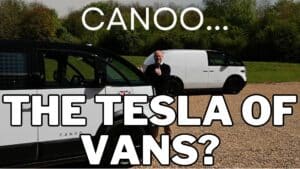The first week of the month sees the SMMT publish the light commercial vehicle registration numbers for the previous month. It’s a time for many in the industry to bite their nails in anticipation, particularly manufacturers, anxious to see how they have performed in comparison to their competitors. It’s the same for us here at EV Essentials Towers, hoping that there has been a healthy increase in the number of electric vans sold compared to this time last year.
Once again, the numbers are disappointing, to say the least. Taking the month in isolation, only 4.2% of vehicles registered were battery electric (BEV), just a 0.1% increase from the same month last year. The year-to-date numbers are also less than ideal, the first 5 months of 2024 have seen a BEV market share of 4.8%, down from 5.2% in the same period in 2023.
We love trawling through the excellent data provided by New Automotive which highlights which manufacturers are doing well, and those that have a serious amount of work still to do. Year to date, Peugeot has registered the largest number of electric vans, taking 17.6% of the market. It equates to 13.3% of the brand’s total LCV sales so they are looking well on course to achieve the 10% ZEV Mandate requirement. In pure numbers, Vauxhall is in second place with a 14.3% slice of the pie but, this is only 7.5% of the Luton-based firm’s total LCV registrations. Volkswagen gets the bronze medal with 14.2% of the electric van market but they also are only tracking at 7.5% of their total sales being of the battery variety.
The biggest names are still struggling. Only 3.3% of Mercedes-Benz’s sales have been electric in the first 5 months of the year, and the mighty Ford is in an even worse position with a tiny 1.3% of its total registrations being BEVs. As we’ve said before though, both of these manufacturers have new electric models just about to come onto the market so will no doubt be hoping for a big lift towards the end of the year. Will they make that 10%? No, not a chance, they will be working to mitigate their fines by borrowing from next year, buying credits from overachievers or just budgeting for a financial hit.
Many, including us, have regularly speculated as to why BEV sales have effectively flatlined, making the 10% ZEV Mandate target now look pretty much unattainable to most manufacturers. We’re not going to repeat ourselves here but, the manufacturers and dealers can only do so much. If we get a change of government in July, it’ll be interesting to see if they will take steps to support the industry. Subsidies, grants, and infrastructure investment will all help but, one of the biggest obstacles that needs to be overcome is the attitude of the SME operator in particular. They are being influenced by ‘pub talk’ which, whilst sometimes raising relevant points mostly consists of outdated opinions regarding range, charging, payloads and even the capital cost of the vehicle itself. Is it time for a national campaign to educate and inform? To make it credible it would need to face genuine concerns and acknowledge that a BEV van won’t suit everyone, but, done right, it could well turn the tide. Hopefully, the next government will take on board the Zero Emission Van Plan that industry lobbyists have put forward.




